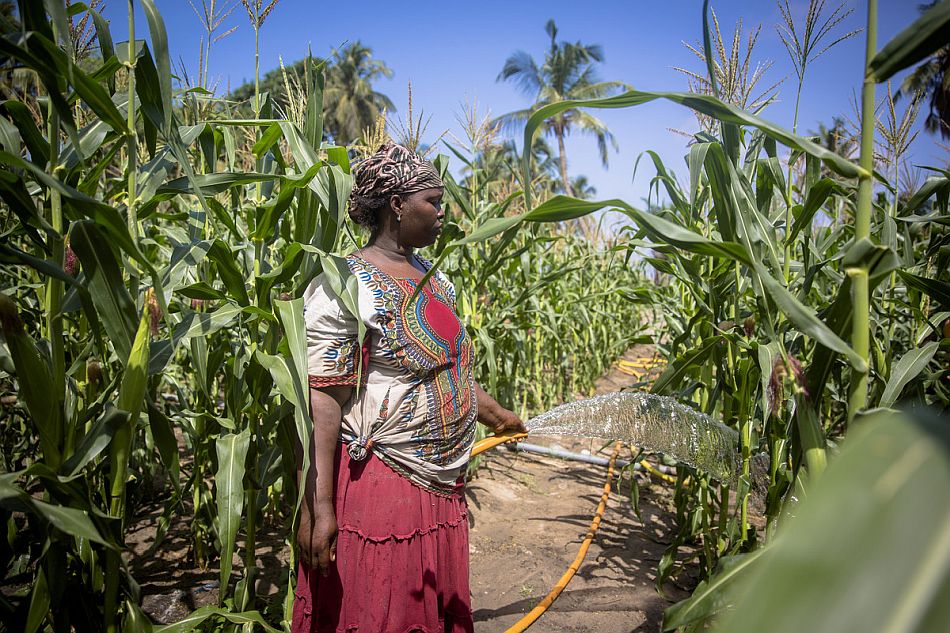By Olufunke Cofie, Country Representative – Ghana, Regional Representative – West Africa
Agriculture is a major driver of economic development in Africa, and a keystone of food security and poverty alleviation. Smallholder farmers dominate agriculture across the continent, with an estimated 33 million smallholder farmers contributing up to 70 percent of the food supply in Africa as whole.

However, intensifying competition for limited resources — exacerbated by urbanization, climate change, and economic, financial, and health crises — is widening inequalities, increasing exclusion, and causing significant structural changes. In Ghana, for example, agriculture has been experiencing a steady decline through the decades; whereas the sector once contributed more than 60 percent to GDP in the 1970s, in 2020 agriculture accounted for just 19 percent of GDP.
All the while, the U.N. Sustainable Development Goals seek to have agriculture serve as an engine of growth as communities across the continent and around the world seek to adapt to climate change. And as is so often the case — in Ghana and beyond — water is at the heart of these efforts.
Food security is water security
Access to water in its various forms is fundamental in order to maintain food security. Groundwater in particular is a major source of irrigation for smallholder farmers.
In West Africa, groundwater replenishment is largely dependent on the region’s seasonal rainfalls. But with climate change disrupting the frequency, timing, and intensity of the rainfall patterns across the continent, extended droughts and intensified flooding have become the new normal.
Indeed, the impact of climate change seems distressingly obvious, with close to three quarters of all natural disasters between 2001 and 2018 linked to water in some form or fashion. West Africa is placed at particularly high water risk, facing the threats of hunger, disease, energy shortages, and poverty due to multiple factors caused by water scarcity, pollution, and flooding. Given the region’s heightened state of vulnerability, climate change has the potential to overwhelm the region if not addressed proactively.
As the largest user of water globally, agriculture requires innovative, science-driven solutions to prudently manage water resources, while maintaining acceptable quality standards for agricultural purposes. Solutions also need to be integrated to help farmers adapt to climate change and strengthen resilience in food systems. At the same time, solutions must also cater to nutritional needs of communities without over-burdening the natural resource base.
Interventions typically feature a combination of measures such as climate-smart agriculture (CSA), early warning systems, climate-resilient water storage infrastructure, and digital innovations to help create an inclusive water landscape for the local communities. Rural livelihoods in Ghana and elsewhere also benefit from small-scale irrigation, with evidence showing that simple, cost-effective technologies can significantly improve water-use efficiency.
Tapping into and retaining precious groundwater
Accessing and retaining groundwater has been a Herculean challenge to small-scale farmers, particularly in the face of the unfolding climate crisis and rising energy costs. To this end, solar-powered irrigation pumps are particularly attractive as economically and environmentally sustainable alternative to fossil fuel-powered pumps. To further guide investments, suitability mapping methodologies can help locate suitable and promising areas with higher rates of success, and therefore are particularly useful in efforts to deploy solar-powered irrigation pumps at scale. Technology can also be used to facilitate artificial recharging of deeper aquifer layers with excess groundwater runoff, which can later be used for crop production during the dry season.
Gaining the upper hand in the fight against climate change could be achievable in West Africa if groundwater is managed properly. For example, bundling-up water solutions and services can help scale-up groundwater irrigation when backed by appropriate investment pathways, site-specific tools, and essential business development services. Investments in irrigation can also be led by farmers themselves. This approach shows particular promise in the case of smallholder farmers, as it complements investments in public and communal irrigation schemes at the same time.
Additionally, innovatively bundled socio–technical solutions can improve productivity and achieve desired scaling in farmer-led irrigation in partnership with public and private sector entities. However, mainstreaming science-driven evidence-based solutions into the process needs to be further reinforced by improved policies and capacity development in order to facilitate the uptake of the prescribed approaches.
All hands on deck
A multitude of social, economic, and environmental transformations are introducing new threats and vulnerabilities into rural agrarian societies, which are the lifeblood of agriculture. Rather than viewing these changes as a problem to be solved, evidence-based approaches can trigger positive social transformation in Ghana and elsewhere, creating opportunities for rural and urban communities alike.
But to achieve a lasting impact, a wider range of stakeholders need to collectively embrace a participatory approach — one that brings together development planners, decision-makers, and community-based organizations to deliver context-sensitive solutions that prioritize rural women, youth, and other marginalized groups so that viable economic opportunities can be delivered to the entire community.
Supporting these efforts, IWMI West Africa, in collaboration with the Economic Community of West African States (ECOWAS) Commission and the Permanent Interstate Committee for Drought Control in the Sahel (CILSS), held a regional meeting to promote sustainable groundwater irrigation in West Africa during the 2022 World Water Day commemoration. IWMI’s Olufunke Cofie also led a session at the 9th World Water Forum focusing on water for agricultural climate resilience. Participants included not only policymakers at the national and regional levels, but also development partners, private sector investors, government planning departments, researchers, NGOs, farmer representatives, water managers, and others. These events revealed opportunities and showcased approaches for enhancing the sector’s climate resilience through the scaling of innovative and integrated water management solutions in West Africa.
Click here to read about IWMI’s key takeaways from the 9th World Water Forum, and click here to learn more about IWMI’s work in West Africa.
View IWMI’s presentations for the World Water Day 2022 commemoration held in Ghana:

